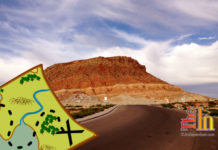Album Review: Django Django’s “Born Under Saturn” pleases god of the harvest
Written by Jason Gottfried
Django Django: Born Under Saturn
A band so nice they named it twice, Django Django joins the ranks of multiply-named bands such as Duran Duran, Mr. Mister, Tony! Toni! Toné!, and The Yeah Yeah Yeahs. They swear that they’re not named after legendary jazz guitarist Django Reinhardt, but they should be.
Typically associated with the harvest in general, Saturn is one of the more complex and historically enigmatic Roman gods, and true to its namesake, “Born Under Saturn” defies categorization. There are bits of psychedelic rock, handfuls of electronica, and armfuls of indie rock, with at least a pinch of dozens of other musical influences, from African folk music to jazz to EDM. Similar to Tame Impala (who sound so alarmingly like John Lennon’s 2015 solo album collection project that it’s worth starting another Beatles conspiracy theory), Django Django succeed at emulating bands of yesteryear, from Pink Floyd to Depeche Mode.
In its complexity, “Born Under Saturn” by Django Django appeals to an extremely wide audience. The most cerebral music theory nerd will rub his chin, closely following voice leading and analyzing the rich harmonic vocabulary, whereas the most vapid frat kid will happily blare its contagiously danceworthy beats. It’s fascinating from a production mindset, with its widely fluctuating instrumentation and liberal use of both traditional acoustic instruments and electronic sounds, but the end result works more like peanut butter and chocolate than a seemingly random combination of jelly beans and mayonnaise.
“Born Under Saturn” opens strongly with “Giant,” an infectiously groovy dance tune primarily driven by drums and a piano-doubled bass line. There’s that moment when listening to a song, and the cowbell comes in, prompting an exclamation of “oh, hell yeah.” Well, that’s “Giant,” an unstoppable head-nodder that dares you to sit still (good luck).
What could just as easily be either Randy Rhoads’ or Wayne Coyne’s guitar opens “Shake and Tremble,” which starts out weird but quickly becomes a neo-Beach Boys surf rock/alt rock hybrid. Indeed, frontman Vincent Neff frequently sounds like a young Brian Wilson on this album, not only in terms of timbre but even in the way he phrases his melodies.
The same can be said of “Found You,” wherein Neff’s overdubbed vocal harmonies sound eerily like something from “Pet Sounds.” But throw in some pipe organ and guiro and mix in some unpredictable chord changes, and you’ve got something that’s “baroque” in ways Wilson and friends never saw coming.
Leaning more towards EDM but veering off toward whatever lands lie between Fourtet and MGMT, “First Light” is another genre bender that definitely lies near dancehall territory but doesn’t sit firmly within its normally rather plastic walls. Similarly, “Pause Repeat” almost sounds like Simon and Garfunkel got stoned with Animal Collective and wrote a song. It’s far more plaintive and uncomplicated than Animal Collective but easily just as kaleidoscopic.
Although heavy on big vocal harmonies, “Reflections” is perhaps even more electronic than “First Light.” It wants to break into an early ‘90s Madonna dance track but ends up somewhere closer to Bjork.
“Vibrations” is less serious than some others on this album but lyrically grander, as “melodies fall from the skies / crimson and golden vibrations of paradise,” with equal measures of hand drumming and hip-hop influence.
Röyksopp could have produced at least the verse to “Shot Down,” which is driven by a constantly modulating synth bass, and REM’s Michael Stipe easily could have co-written the boyish, harmonically restless chorus. For the eighth time in a row, Django Django successfully assimilates several musical influences and distills them into something entirely new.
“High Moon” would make an equally good theme song either for “The Addams Family”—if it were set in modern-day Los Angeles—or for “The Lost Boys”—if it were set in outer space.
Backing away from the computer console, “Beginning to Fade” is a slow, guitar-driven groove that simultaneously evokes Cowboy Junkies and Mazzy Star.
“4000 years” moves back into floor-stomping, afro-beat territory but against a backdrop of Kraftwerkian sound manipulation, with squealing trumpets intruding at the end—just to keep you guessing.
Almost pre-disco Motown, “Break the Glass” is either lo-fi club music or a companion piece to “Fear and Loathing in Las Vegas.” Maybe it’s somehow both. A malfunctioning arpeggiator leads directly into the just as psychedelic “Life We Know.”
If “Born Under Saturn” has a flaw, it’s that a little fat could have been trimmed. Clocking in at about 54 minutes, it feels a little unfocused at times, perhaps due to the nonstop sound experiments and chameleon games. That said, it starts strongly, ends strongly, and touches on just about every element present in almost a century’s worth of transcontinental pop music. It’s well-suited for blaring at parties or intimate listening. While it certainly isn’t cerebral, it’s definitely intelligent, but never at the sacrifice of feeling good. At any rate, it belongs on every iPod and in every car cd player this summer.




